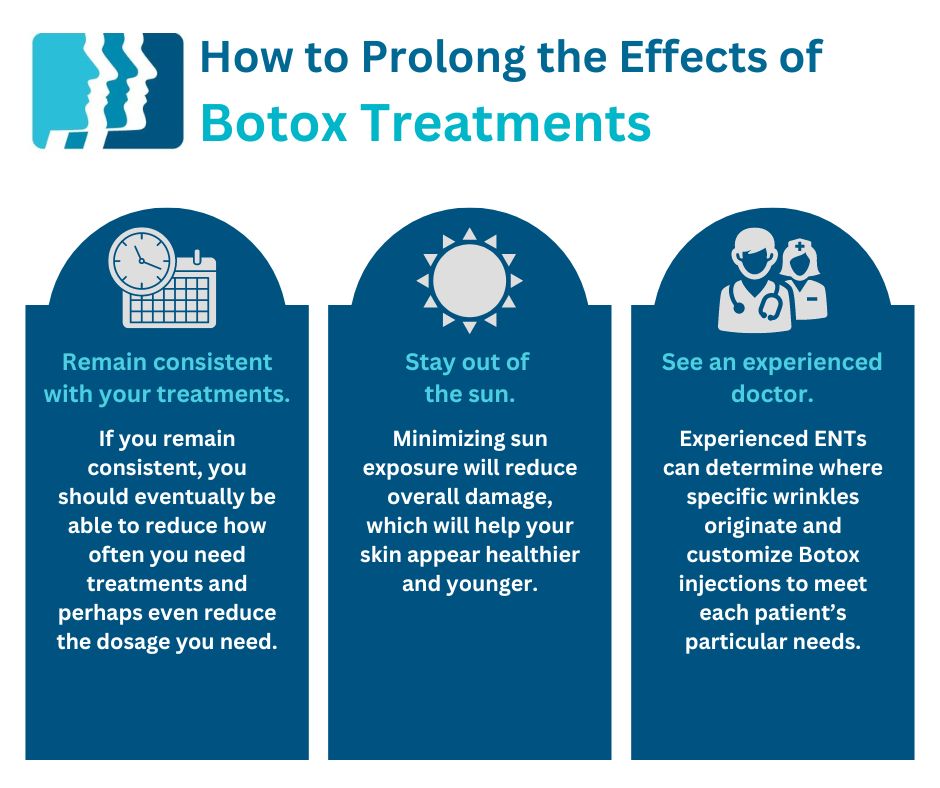How Often Should You Get Botox Touched Up?

Botox is undoubtedly the number one non-invasive procedure in 2022. According to the American Society of Plastic Surgeons, over 7.4 million people in the U.S. receive Botox treatments in a single year.
And unlike a decade ago, many of the social stigmas about Botox no longer exist. It’s become so commonplace for both cosmetic and medical purposes that few people, if any, look askance at someone who’s had treatments. Plus, when Botox is given correctly, most people don’t look like they’ve had any work done at all.
Since Botox is a temporary treatment, the effects fade over time. So, how often should you get Botox refreshed after your initial treatment? Let’s dive into the details.
What Determines How Often You Should Get Botox Treatments?
Generally, the effects of Botox last about three to four months. While injection location, dosage amount, and the recipient’s skin type or coloration vary, none of these factors really affect the length of time between treatments.
Botox doesn’t work directly on the skin, but on the muscles beneath the skin, meaning skin thickness and coloration don’t affect the treatments. And the length of effectiveness in the muscles comes down mainly to the half-life of the medication itself, not quantity or location.
Instead, the number of treatments you’ve already had is the main factor that could alter how frequently you need Botox injections moving forward.
Botox can cause some weakness in the treated muscles over time. So if you’ve already had several Botox injections, you might find that the effects last longer for you. As a result, once you’ve had Botox treatments for one to two years, you might be able to schedule them every six months instead of every three months.
Of course, this varies from person to person. But generally speaking, the longer you continue to get Botox injections, the less frequently you’ll need them.
Why Do the Effects of Botox Wear Off?
To fully understand how often you should get Botox, it’s helpful to know how Botox works and why its effects eventually wear off.
Botox is a paralytic agent made from a bacteria-produced toxin, and it temporarily paralyzes the facial muscles it’s injected into. Because wrinkles actually come from muscle movement, this relaxing effect smooths the skin for a more youthful appearance.
While “paralytic agent” may sound frightening, Botox doesn’t damage your nerve endings. It just temporarily prevents them from communicating with your muscles.
Normally, your nerves release a neurotransmitter called acetylcholine to control your muscles. When a doctor injects Botox, however, the toxin binds to localized nerve endings and prevents them from releasing that neurotransmitter. As long as Botox remains connected to your nerve endings, it blocks the signals that would normally tell your muscles to move.
Eventually, your body metabolizes the Botox. Once it dissipates, your nerves can release acetylcholine again, restoring communication between your nerves and muscles.
What Can I Do to Prolong the Effects of My Botox Treatments?
If you do a quick Google search, you’ll find all sorts of tips and tricks to prolong the effects of Botox treatments. Unfortunately, those tips aren’t always reliable or even based on factual research. Some could even be detrimental.
To support the effects of your Botox injections, the best things you can do are:
- Remain consistent with your treatments: Don’t wait too long to come in for your regular treatments. Schedule your Botox appointments ahead of time and stick with them. Remember that if you remain consistent, you should eventually be able to reduce how often you need treatments and perhaps even reduce the dosage you need.
- Stay out of the sun: The sun’s ultraviolet (UV) rays damage skin cells and can lead to sun spots, reduced elasticity, and skin cancer. Minimizing sun exposure won’t necessarily reduce your wrinkles, since those are caused by muscular movement, but it will reduce overall damage, which will help your skin appear healthier and younger.
- See an experienced doctor: ENT doctors have an extensive knowledge of head and neck anatomy, including facial musculature. Knowing exactly which muscles perform which actions allows experienced ENTs to determine where specific wrinkles originate and customize Botox injections to meet each patient’s particular needs.

Talk With Your ENT About How Often You Should Get Botox
It’s always best to speak directly with your physician about medical treatments. You can ask questions about whether Botox will work for you and how often you should get Botox. Every person is different, and your doctor can advise you based on the details of your situation.
Our knowledgeable staff at Ear Nose & Throat Associates of Lubbock will ensure you have a safe and positive experience with Botox. If you’d like to receive ongoing injections, we can also help you establish a treatment schedule to maintain youthful-looking skin and achieve long-lasting results.
Dr. Cuthbertson is a physician at Ear Nose & Throat Associates of Lubbock. He joined the team at ENT Lubbock from Houston, where he was chief resident of the prestigious Bobby R. Alford Department of Otolaryngology at Baylor College of Medicine. He is board certified in Otolaryngology and Head & Neck Surgery and has quickly built a reputation, not only as an extremely skilled surgeon, but as an approachable and compassionate clinician adept in the newest standards and technologies. Learn more about Dr. Cuthbertson.
Categories:








